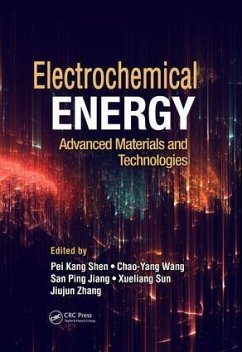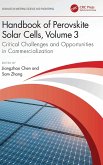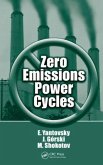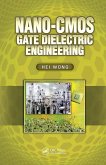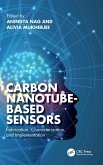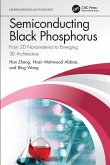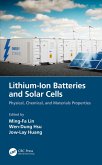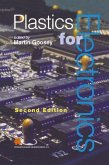Electrochemical Energy
Advanced Materials and Technologies
Herausgeber: Shen, Pei Kang; Zhang, Jiujun; Sun, Xueliang; Jiang, San Ping; Wang, Chao-Yang
Schade – dieser Artikel ist leider ausverkauft. Sobald wir wissen, ob und wann der Artikel wieder verfügbar ist, informieren wir Sie an dieser Stelle.
Electrochemical Energy
Advanced Materials and Technologies
Herausgeber: Shen, Pei Kang; Zhang, Jiujun; Sun, Xueliang; Jiang, San Ping; Wang, Chao-Yang
- Gebundenes Buch
- Merkliste
- Auf die Merkliste
- Bewerten Bewerten
- Teilen
- Produkt teilen
- Produkterinnerung
- Produkterinnerung
This book gives a comprehensive description of electrochemical energy conversion and storage technologies as well as the associated latest material and new technology development. It addresses a variety of topics such as electrochemical processes, materials, components, assembly and manufacturing, degradation mechanisms, challenges and strategies. With contributions from researchers who are at the top of their fields and on the cutting edge of technology, the book includes in-depth discussions ranging from comprehensive understanding to the engineering of components and applied devices.
Andere Kunden interessierten sich auch für
![Handbook of Perovskite Solar Cells, Volume 3 Handbook of Perovskite Solar Cells, Volume 3]() Handbook of Perovskite Solar Cells, Volume 3182,99 €
Handbook of Perovskite Solar Cells, Volume 3182,99 €![Zero Emissions Power Cycles Zero Emissions Power Cycles]() Evgeny YantovskyZero Emissions Power Cycles264,99 €
Evgeny YantovskyZero Emissions Power Cycles264,99 €![Nano-CMOS Gate Dielectric Engineering Nano-CMOS Gate Dielectric Engineering]() Hei WongNano-CMOS Gate Dielectric Engineering152,99 €
Hei WongNano-CMOS Gate Dielectric Engineering152,99 €![Carbon Nanotube-Based Sensors Carbon Nanotube-Based Sensors]() Carbon Nanotube-Based Sensors183,99 €
Carbon Nanotube-Based Sensors183,99 €![Semiconducting Black Phosphorus Semiconducting Black Phosphorus]() Han ZhangSemiconducting Black Phosphorus72,99 €
Han ZhangSemiconducting Black Phosphorus72,99 €![Lithium-Ion Batteries and Solar Cells Lithium-Ion Batteries and Solar Cells]() Ming-Fa LinLithium-Ion Batteries and Solar Cells219,99 €
Ming-Fa LinLithium-Ion Batteries and Solar Cells219,99 €![Plastics for Electronics Plastics for Electronics]() M. GooseyPlastics for Electronics116,99 €
M. GooseyPlastics for Electronics116,99 €-
This book gives a comprehensive description of electrochemical energy conversion and storage technologies as well as the associated latest material and new technology development. It addresses a variety of topics such as electrochemical processes, materials, components, assembly and manufacturing, degradation mechanisms, challenges and strategies. With contributions from researchers who are at the top of their fields and on the cutting edge of technology, the book includes in-depth discussions ranging from comprehensive understanding to the engineering of components and applied devices.
Produktdetails
- Produktdetails
- Verlag: CRC Press
- Seitenzahl: 622
- Erscheinungstermin: 1. Dezember 2015
- Englisch
- Abmessung: 282mm x 218mm x 33mm
- Gewicht: 1950g
- ISBN-13: 9781482227277
- ISBN-10: 1482227274
- Artikelnr.: 43020927
- Herstellerkennzeichnung
- Libri GmbH
- Europaallee 1
- 36244 Bad Hersfeld
- gpsr@libri.de
- Verlag: CRC Press
- Seitenzahl: 622
- Erscheinungstermin: 1. Dezember 2015
- Englisch
- Abmessung: 282mm x 218mm x 33mm
- Gewicht: 1950g
- ISBN-13: 9781482227277
- ISBN-10: 1482227274
- Artikelnr.: 43020927
- Herstellerkennzeichnung
- Libri GmbH
- Europaallee 1
- 36244 Bad Hersfeld
- gpsr@libri.de
Pei Kang Shen obtained his BSc in electrochemistry at Xiamen University in 1982. He received his PhD in chemistry at Essex University in 1992. From then on, he has been working at Essex University, Hong Kong University, the City University of Hong Kong, and the South China University of Technology. Since 2001, he has served as a professor and director of Advanced Energy Materials Research Laboratory at the Sun Yat-sen University, Guangzhou, China. He is the author of more than 300 publications. His research interests include fuel cells and batteries, electrochemistry of nanomaterials and nanocomposite functional materials, and electrochemical engineering. Chao-Yang Wang is William E. Diefenderfer Chair in mechanical engineering and distinguished professor of mechanical engineering, chemical engineering, and materials science and engineering at the Pennsylvania State University. He has been the founding director of Penn State Electrochemical Engine Center since 1997. Dr. Wang holds several patents and has published two books. He has more than 12,000 Science Citation Index citations, an h-index of 65 (Web of Science), and is one of 187 highly cited researchers in engineering named by Thomas Reuter in 2014. His research interests cover the transport, materials, manufacturing, and modeling aspects of batteries and fuel cells. San Ping Jiang obtained his BEng in ceramic materials from South China University of Technology in 1982 and PhD in electrochemistry from The City University, London, in 1988. He is a professor at the Department of Chemical Engineering, deputy director of Fuels and Energy Technology Institute, Curtin University, Australia, and adjunct professor at University of the Sunshine Coast, Australia. Dr. Jiang has authored and coauthored 10 book chapters and three books, and published approximately 270 journal papers. His research interests encompass solid oxide fuel cells, proton-exchange membrane and direct alcohol fuel cells, water electrolysis, solid-state ionics, electrocatalysis, and nanostructured functional materials. Xueliang (Andy) Sun is a professor and Canada Research Chair (Tier I) for the development of nanomaterials for clean energy, at the University of Western Ontario, Canada. Dr. Sun received his PhD degree in materials chemistry at the University of Manchester, UK, in 1999. Then, he worked as a postdoctoral fellow in the University of British Columbia, Canada, during 1999-2001. He was a research associate at the National Institut de la Recherche Scientifique, Quebec, Canada, during 2001-2004. Dr. Sun's research is focused on advanced nanostructured materials for energy conversion and storage, including fuel cells and Li batteries. Jiujun Zhang is a principal research officer at the National Research Council of Canada and a fellow of the International Society of Electrochemistry. His expertise lies in electrochemistry, photoelectrochemistry, spectroelectrochemistry, electrocatalysis, fuel cells (polymer electrolyte membrane fuel cells, solid oxide fuel cells, and direct methanol fuel cells), batteries, and supercapacitors. Dr. Zhang received his BS and MSc in electrochemistry from Peking University in 1982 and 1985, respectively, and his PhD in electrochemistry from Wuhan University in 1988. He serves as the editor/editorial board member for several journals and as series book editor for Electrochemical Energy Storage and Conversion, CRC Press.
Overview of Electrochemical Energy Storage and Conversion. Advanced
Materials and Technologies for Li-Ion Rechargeable Batteries. Advanced
Materials and Technologies for Metal-Air Rechargeable Batteries. Advanced
Materials and Technologies for Lead-Acid Rechargeable Batteries. Advanced
Materials and Technologies for Fuel Cells. Advanced Materials and
Technologies for Supercapacitors. Advanced Materials and Technologies for
Liquid Redox Rechargeable Batteries. Advanced Materials and Technologies
for Water Electrolysis Producing Hydrogen.
Materials and Technologies for Li-Ion Rechargeable Batteries. Advanced
Materials and Technologies for Metal-Air Rechargeable Batteries. Advanced
Materials and Technologies for Lead-Acid Rechargeable Batteries. Advanced
Materials and Technologies for Fuel Cells. Advanced Materials and
Technologies for Supercapacitors. Advanced Materials and Technologies for
Liquid Redox Rechargeable Batteries. Advanced Materials and Technologies
for Water Electrolysis Producing Hydrogen.
Overview of Electrochemical Energy Storage and Conversion. Advanced
Materials and Technologies for Li-Ion Rechargeable Batteries. Advanced
Materials and Technologies for Metal-Air Rechargeable Batteries. Advanced
Materials and Technologies for Lead-Acid Rechargeable Batteries. Advanced
Materials and Technologies for Fuel Cells. Advanced Materials and
Technologies for Supercapacitors. Advanced Materials and Technologies for
Liquid Redox Rechargeable Batteries. Advanced Materials and Technologies
for Water Electrolysis Producing Hydrogen.
Materials and Technologies for Li-Ion Rechargeable Batteries. Advanced
Materials and Technologies for Metal-Air Rechargeable Batteries. Advanced
Materials and Technologies for Lead-Acid Rechargeable Batteries. Advanced
Materials and Technologies for Fuel Cells. Advanced Materials and
Technologies for Supercapacitors. Advanced Materials and Technologies for
Liquid Redox Rechargeable Batteries. Advanced Materials and Technologies
for Water Electrolysis Producing Hydrogen.

